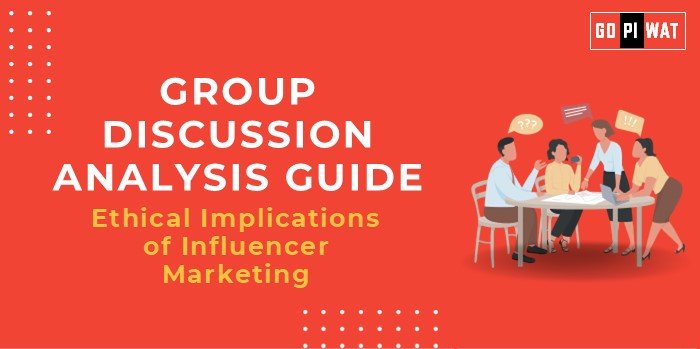💬 Group Discussion (GD) Analysis Guide: Ethical Implications of Influencer Marketing
🌟 Introduction to the Topic
Opening Context:
Influencer marketing has become a dominant force in modern advertising, with social media influencers leveraging their platforms to sway consumer decisions. As of 2024, this industry is projected to reach $21 billion globally, raising critical ethical questions about transparency, accountability, and consumer protection.
Topic Background:
Initially emerging as a grassroots promotional strategy, influencer marketing evolved with platforms like Instagram and TikTok enabling content creators to gain significant commercial influence. However, the lack of regulation in this domain has led to growing concerns about false advertising, undisclosed sponsorships, and the psychological impact on consumers, particularly younger audiences.
📊 Quick Facts and Key Statistics
- 🌍 Global Market Value: $21 billion (2024) – Demonstrates the economic scale and influence.
- 📉 Influencer Trust Gap: 54% of consumers feel influencers prioritize sponsorship over authenticity (Statista, 2023).
- 👦 Youth Impact: 70% of teenagers trust influencers more than traditional celebrities (Common Sense Media, 2023).
- ⚠️ Undisclosed Ads: 40% of influencer promotions lack proper disclosure (FTC, 2022).
- 🧠 Mental Health Risks: 62% of surveyed users report anxiety from idealized influencer portrayals (APA, 2023).
🤝 Stakeholders and Their Roles
- Influencers: Content creators shaping consumer perceptions and behaviors.
- Brands: Companies leveraging influencers to promote products or services.
- Platforms: Social media networks facilitating influencer reach and engagement.
- Regulators: Government and watchdog bodies ensuring compliance and consumer protection.
- Consumers: Target audience impacted by marketing practices.
🏆 Achievements and Challenges
✔️ Achievements
- Boost to Small Businesses: Influencers help niche brands reach global audiences.
- Increased Awareness: Campaigns on issues like sustainability gain traction.
- Career Pathways: Emergence of influencer marketing as a profession.
❌ Challenges
- Transparency Issues: Undisclosed ads violate trust and regulations.
- Psychological Harm: Unrealistic standards lead to mental health concerns.
- Global Comparisons: While the UK mandates ad disclosures, compliance in other countries lags.
📚 Case Studies
- UK Advertising Standards Authority: Effective enforcement of ad transparency.
- India’s 2023 Guidelines: Growing regulatory framework for digital ads.
💡 Structured Arguments for Discussion
- Supporting Stance: “Influencer marketing has democratized advertising, providing opportunities for small businesses and diverse voices.”
- Opposing Stance: “The lack of ethical standards has led to consumer exploitation and misinformation.”
- Balanced Perspective: “While influencer marketing offers immense potential, it requires stricter ethical guidelines for sustained trust.”
🛠️ Effective Discussion Approaches
- Opening Approaches:
- Begin with a data-driven insight: “The global influencer market’s $21 billion valuation reflects its power, but at what ethical cost?”
- Highlight a case study: “Recent controversies, like the undisclosed promotions by celebrity influencers, underline ethical lapses.”
- Counter-Argument Handling: Acknowledge concerns, propose solutions like regulatory mandates or brand audits.
📈 Strategic Analysis of Strengths and Weaknesses
- Strengths: Wide reach, personalization, cost-effectiveness.
- Weaknesses: Ethical dilemmas, lack of accountability.
- Opportunities: Regulation, consumer education, technology-enhanced disclosures.
- Threats: Public trust erosion, regulatory penalties.
🎓 Connecting with B-School Applications
- Real-World Applications: Explore influencer strategies for niche markets or ethical branding in business simulations.
- Sample Interview Questions:
- “How should brands balance ethical considerations and influencer ROI?”
- “Discuss the role of regulations in influencer marketing.”
- Insights for Students:
- Importance of digital ethics, regulatory frameworks, and consumer psychology in marketing roles.


